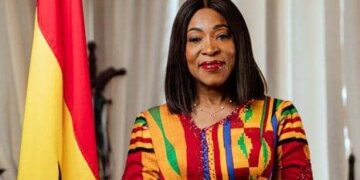Ghanaian foreign minister, Hon Shirley Ayorkor Botchwey, has been selected as the incoming Secretary-General of the Commonwealth.
This was announced Friday, October 25, 2024, at this year’s Commonwealth Heads of Government Meeting (CHOGM) held in Apia, Samoa.
The 27th meeting of the heads of government of the Commonwealth of Nations ran from 25–26 October 2024 and was preceded by ministerial meetings, fora, and side events which began on 21 October 2024.
“Truly humbled by the overwhelming support of the Commonwealth Heads of Government in selecting me as the incoming Secretary-General of the Commonwealth. The work indeed lies ahead!” said Shirley, the Minister for Foreign Affairs and Regional Integration of Ghana.

She added: “I’m honored and humbled by the trust of Commonwealth leaders. A lot of work lies ahead. But together, we shall work for a New Commonwealth that works for all its citizens.”
Shirley succeeds Dominica-born Patricia Scotland KC who served as the 6th Commonwealth Secretary-General.
“It is my honor to pass the baton to my dear sister, the Hon Shirley Ayorkor Botchwey, who will succeed me as the next Commonwealth Secretary-General. She will be uniquely blessed, as I have been, to hold this office and serve our precious Commonwealth,” said Patricia in a message on X.

Shirley was appointed foreign minister by President Nana Akufo-Addo on 10 January 2017. She was a Member of Parliament for Anyaa-Sowutuom from 2013 to 2021 and served as Deputy Minister of Foreign Affairs and a Minister of State at the Ministry of Water Resources, Works, and Housing under John Kufuor. She was a member of the New Patriotic Party.
The Commonwealth is a voluntary association of 56 independent and equal sovereign states. Our combined population is 2.7 billion, of which more than 60 percent is aged 29 or under.
The Commonwealth spans the globe and includes both advanced economies and developing countries. Thirty-three of our members are small states, many of which are island nations.
The Commonwealth Secretariat supports member countries to build democratic and inclusive institutions, strengthen governance, and promote justice and human rights. Member countries are supported by a network of more than 80 intergovernmental, civil society, cultural and professional organizations.









